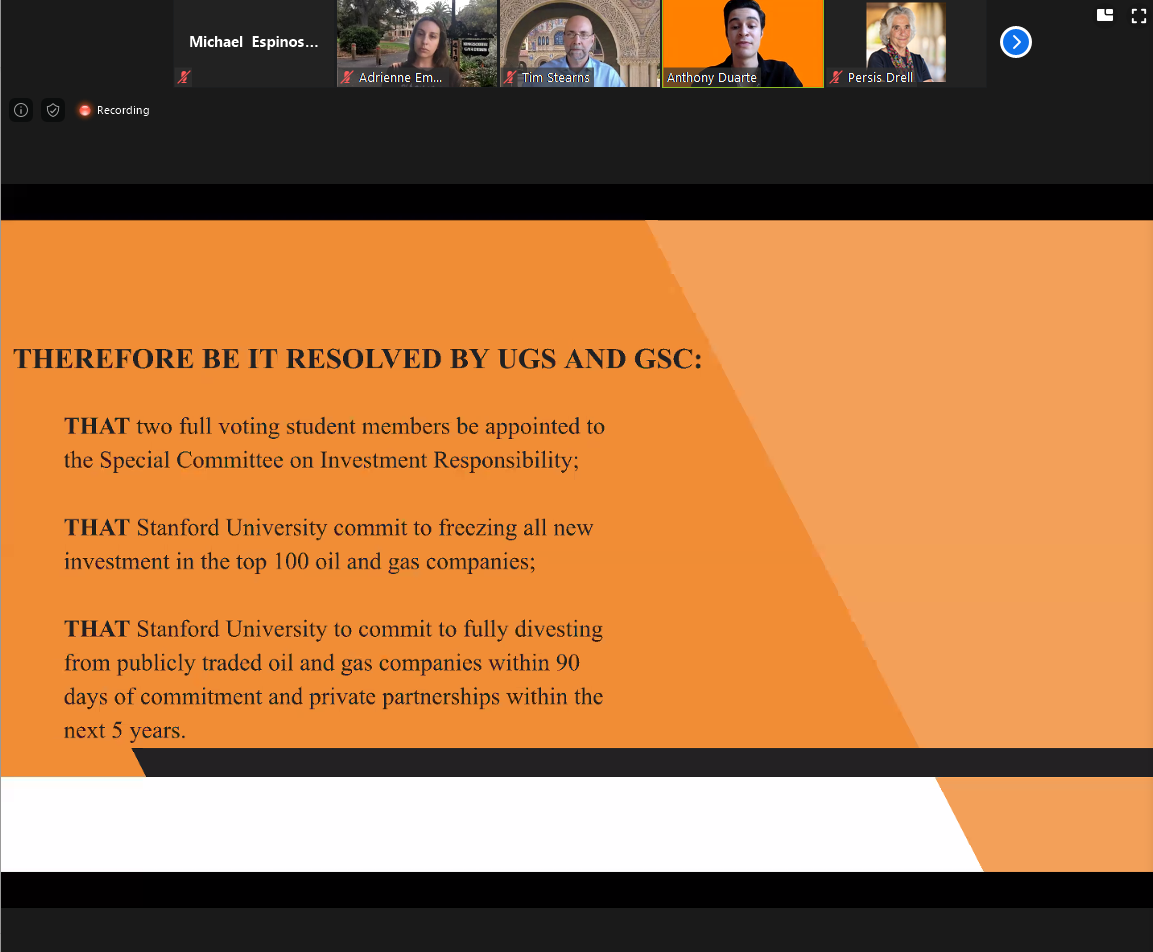In recent days there has been significant discussion on the results of the Stanford Faculty Senate’s vote on a resolution to divest from fossil fuel companies. Much of the discussion has focused on the seemingly irrational arguments used, ignorance to the topic at hand, and, what many students and other faculty saw as a failure to act. While I agree with all of these arguments and am disappointed by the Senate’s actions, I will ignore those in this piece. What I am presenting today is simple: There were unacceptable conflicts of interest, or at least the appearance of them, which went unaddressed. To maintain confidence in our governance system, the results must be nullified, and the resolution should be brought back for a vote where conflicts of interest are addressed. There are three distinct areas of conflicts of interest that I will discuss: program and research funding, research partnerships and personal finances.
Dean Stephen Graham of the School of Earth, Energy and Environmental Science provided an argument against the divestment resolution that many hundreds of graduate students in his school have been supported financially by the fossil field industry. There was an implication that a symbolic gesture of divestment might jeopardize such funding in the future. I was struck by this because it was such an apparent admission of many conflicts of interest, yet Graham was asking faculty to vote against the resolution because of these conflicts of interest! Some might say that just because a faculty member’s lab and research is funded by an industry does not mean they cannot make a rational decision about that industry. For the sake of argument I will accept this and suppose that none of the faculty voted in bad faith. My argument, however, still stands. Even the appearance of conflicts of interest is unethical because it creates distrust in the institution.
Assistant geophysics professor Dustin Schroeder began his statement by informing everyone that in order to meet the Paris Climate Accord goals, we need negative emissions. His argument against the divestment resolution was it could threaten the industry partnerships many researchers have that are critical for developing carbon capture technology. Schroeder admitted his vote was because of this conflict of interest, and he implored other faculty to vote similarly. Neither he nor any other faculty that may have industry partnerships acknowledged their conflicts of interest nor that their votes created an appearance of a conflict of interest.
A further conflict of interest is that of personal finances. No faculty members disclosed during the meeting whether they have financial interests within the fossil fuel industry. I want to be clear, I am not accusing any faculty of having these conflicts of interest. I am, however, accusing them of failure to disclose such information during the meeting.
It is unethical for faculty who have any of these conflicts of interests to have voted on this decision. While faculty are required to report to the University every year such conflicts of interest, they were under no obligation to report them in relation to this vote. I believe, however, they were under an ethical obligation to acknowledge their conflicts of interest and recuse themselves before voting. Given the failure to disclose conflicts of interest, or even the appearance of conflicts of interest, the vote must be nullified. The resolution should be brought back for a proper vote in which conflicts of interest are addressed.
Stanford’s Board of Trustees will be making a final decision on fossil fuel divestment later this month. Regardless of whether the Faculty Senate addresses these concerns, it is imperative that the trustees hold one another to high ethical standards. Those with conflicts of interest within the fossil fuel industry must recuse themselves. Those with relationships that may create an appearance of conflicts of interest must also recuse themselves so their vote does not undermine the legitimacy of the final decision. Further, all trustees must disclose any conflicts of interest they have to the student body for transparency. Failure to do so would be ethically unacceptable, and we, the students of Stanford University, deserve better from our leadership.
Contact David Julian Tattoni dtattoni ‘at’ stanford.edu.
The Daily is committed to publishing a diversity of op-eds and letters to the editor. We’d love to hear your thoughts. Email letters to the editor to [email protected] and op-ed submissions to [email protected].
Follow The Daily on Facebook, Twitter and Instagram.
